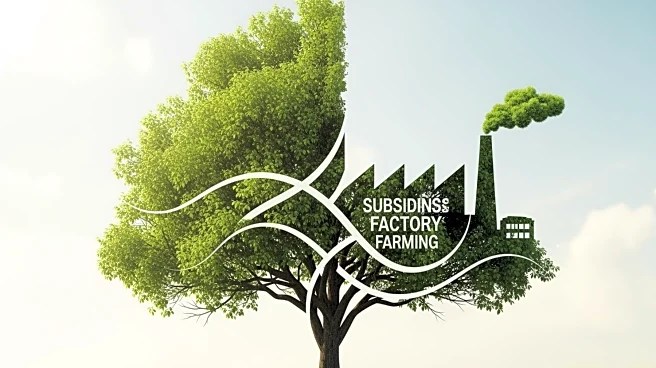What's Happening?
A report by World Animal Protection has revealed that governments worldwide, including those in the US, China, India, and the EU, are contributing to deforestation by subsidizing factory farms. The report,
titled 'Subsidising Factory Farm Harm,' was released ahead of COP30 and highlights the significant subsidies flowing into factory farms, which are leaving small-scale farmers behind and trapping animals in inhumane conditions. Agriculture is one of the most heavily subsidized sectors globally, second only to fossil fuels, and is a major contributor to global greenhouse gas emissions, accounting for 34% of the total. The report calls for a shift away from harmful intensive farming subsidies to help meet the Paris Agreement targets.
Why It's Important?
The findings of the report underscore the environmental and ethical implications of current agricultural subsidy practices. Factory farming is a significant contributor to climate change, biodiversity loss, and animal suffering. The report suggests that redirecting subsidies towards sustainable farming methods could mitigate these impacts. For instance, in the EU, redirecting half of the industrial farming subsidies could save significant water resources and free up land. This shift could also support the transition to plant-based diets, which are more sustainable. The report's call to action is particularly relevant as global leaders prepare for COP30, where climate commitments will be a focal point.
What's Next?
The report urges governments to reconsider their subsidy allocations and support sustainable and humane food systems. This could involve policy changes at national and international levels, particularly in major subsidizing economies like the US, China, and India. The upcoming COP30 conference may serve as a platform for discussing these issues and potentially committing to subsidy reforms. Stakeholders, including environmental and animal welfare organizations, are likely to increase pressure on governments to act on these recommendations.
Beyond the Headlines
The report highlights a transparency gap in how agricultural subsidies are reported, with many countries not disclosing exact figures for subsidies directed to animal production. This lack of transparency complicates efforts to hold governments accountable and assess the true impact of subsidies on the environment and society. Addressing this gap could be a crucial step in reforming subsidy practices and promoting more sustainable agricultural systems.








